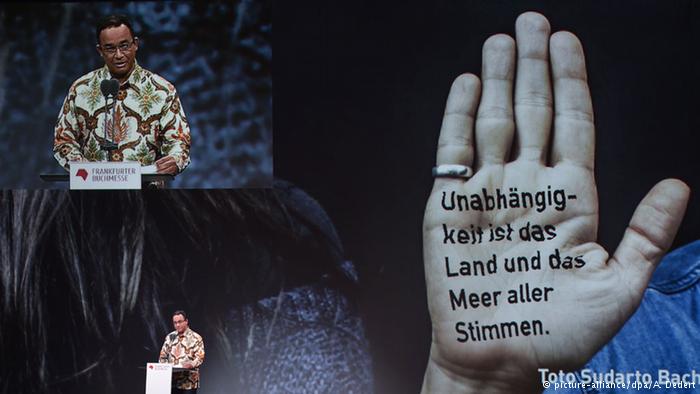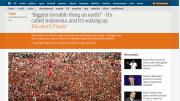On Tuesday night, I went to the opening ceremony of the Frankfurt Book Fair, where Indonesia is the Guest of Honour. True to form, Indonesia worked its last-minute magic and the ceremony was delightful; the highlight for me was the speech by Education Minister Anies Baswedan. I’m not given to enjoying formal speeches by Indonesian Ministers (or by any ministers, for that matter). But Bpk Anies managed to go beyond the platitudes of these occasions, to make a point that was both timely and important. Referring directly to the hundreds of thousands of refugees from different cultural traditions who are besieging the borders of Europe, he spoke of what the world might learn from Indonesia: that diversity is a source of strength, not of weakness. Indonesia, he said, specialises in managing differences. He acknowledged that there had been bad times, including in the 1960s. But overall, the “imagined community” of Indonesia has stood over time as a solid monument to the strength that can be derived from diversity in a tolerant society. His speech made me really proud, and I wasn’t the only one. I even tweeted to that effect once I got connected — for all their expertise in engineering and software manipulation the Germans live in the dark ages when it comes to social media and connectivity.
Then came the news of the burning of a church in Aceh, which must have taken place just a few hours before Bpk Anies made our hearts swell. And the news of the displacement of hundreds of people, seeking refuge from religious-inspired violence, just like the Syrian refugees the minister talked of. It seems from locally-constructed chronologies that the violence was not unpredictable, and indeed the police said it was premeditated. Malay-speaking Aceh Singkil is both the most mixed district of Aceh and the part of Indonesia in which I witnessed most violence myself — including two spectacular catfights between women, complete with jilbabs torn off and handfulls of hair being pulled out. Perhaps we can hope that this is no more than a random incident, that it won’t spark any greater conflict. But having felt so warm and fuzzy about Indonesia’s (generally remarkable) example as a manager of differences, I now feel that Bpk Anies needs to persuade some of his cabinet colleagues to start managing those differences a bit more actively.
You can watch Bpk Anies’s speech here.






I think you might be gilding the lily. Comparing diversity in Europe to that in Indonesia isn’t a valid comparison. Relations between cultures and ethnicities in Indonesia might be radically different if they were forced to share the same land mass. There would be a lot less of them for one thing. Did the recipient cultures of Javanese transmigration increase their unity and strength? I honestly don’t know.
Hmm, yes, I’ve often thought about that. It’s interesting to witness the reaction (now all too obvious in the UK and several other European countries) to the perceived imposition of “unity”. The European experience is actually more similar to Indonesia’s than the US experience, where there’s great diversity but most of it derived from people who came of their own accord to a “new” country. In some ways, Indonesia’s enthusiastic embrace of decentralisation is a kick back against the imposition of a (largely Javanese) national identity in the first five decades of nationhood. But over time and after much wandering away from the “heartland”, I’ve come to think it’s more a strength than a weakness.